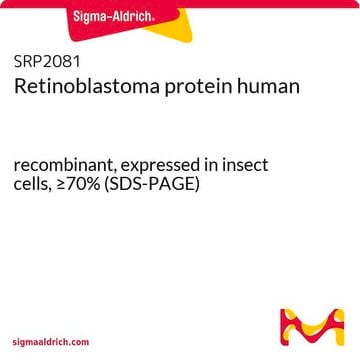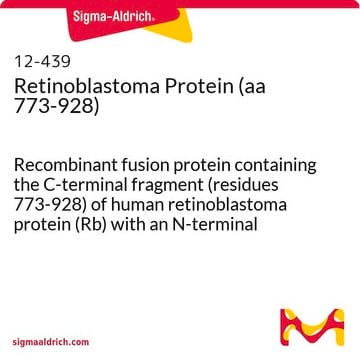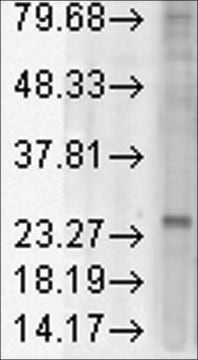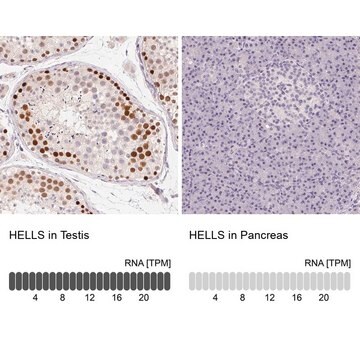SRP0256
RB Active human
recombinant, expressed in E. coli, ≥80% (SDS-PAGE)
Synonym(s):
OSRC, RB1, Retinoblastoma 1, Retinoblastoma-associated protein, p105-Rb
Sign Into View Organizational & Contract Pricing
All Photos(1)
About This Item
UNSPSC Code:
12352200
NACRES:
NA.32
Recommended Products
biological source
human
recombinant
expressed in E. coli
Assay
≥80% (SDS-PAGE)
form
aqueous solution
mol wt
43.5 kDa
packaging
pkg of 200 μg
storage condition
avoid repeated freeze/thaw cycles
concentration
>0.02 mg/mL
NCBI accession no.
UniProt accession no.
shipped in
dry ice
storage temp.
−70°C
Gene Information
human ... RB1(5925)
General description
The gene encoding Retinoblastoma-associated protein (RB1) is a tumor suppressor gene localized on human chromosome 13q14.2. Human recombinant RB protein (773-end) with N-terminal GST tag (GenBank Accession No. NM_000321), expressed in a E. coli expression system.
Application
Retinoblastoma-associated protein (RB1) has been used in cell activity assay. It is also used as a kinase substrate for the kinase assay and in Western blotting.
Biochem/physiol Actions
Retinoblastoma-associated protein (RB1) modulates the cell cycle. It acts as a repressor of transcription mediated by E2 factor (E2F) and influences transcriptional silencing. RB1 modulates mitochondrial activities and has a role in the organisation of heterochromatin. Mutations in the gene encoding this protein have been associated with childhood retinoblastoma.
Physical form
Formulated in 25 mM Tris-HCl, pH 8.0, 100 mM NaCl, 0.05% Tween-20, 30% glycerol and 3 mM DTT.
Preparation Note
Thaw on ice. Upon first thaw, briefly spin tube containing enzyme to recover full content of the tube. Aliquot enzyme into single use aliquots. Store remaining undiluted enzyme in aliquots at -70°C. Note: Enzyme is very sensitive to freeze/thaw cycles.
Storage Class Code
10 - Combustible liquids
WGK
WGK 1
Flash Point(F)
Not applicable
Flash Point(C)
Not applicable
Certificates of Analysis (COA)
Search for Certificates of Analysis (COA) by entering the products Lot/Batch Number. Lot and Batch Numbers can be found on a product’s label following the words ‘Lot’ or ‘Batch’.
Already Own This Product?
Find documentation for the products that you have recently purchased in the Document Library.
Michael J O'Connor et al.
Oncogene, 40(30), 4872-4883 (2021-06-24)
Cyclin D1 is an essential regulator of the G1-S cell-cycle transition and is overexpressed in many cancers. Expression of cyclin D1 is under tight cellular regulation that is controlled by many signaling pathways. Here we report that PARP14, a member
Isabel C Lopez-Mejia et al.
Molecular cell, 68(2), 336-349 (2017-10-21)
The roles of CDK4 in the cell cycle have been extensively studied, but less is known about the mechanisms underlying the metabolic regulation by CDK4. Here, we report that CDK4 promotes anaerobic glycolysis and represses fatty acid oxidation in mouse
Don Anushka Sandaruwan Elvitigala et al.
Developmental and comparative immunology, 52(1), 48-57 (2015-04-29)
Apoptosis plays a key role in the physiology of multicellular organisms and is regulated by different promoting and inhibitory mechanisms. Cytokine-induced apoptotic inhibitor (CIAPI) was recently identified as a key factor involved in apoptosis inhibition in higher vertebrate lineages. However
Sylviane Lagarrigue et al.
The Journal of clinical investigation, 126(1), 335-348 (2015-12-15)
Insulin resistance is a fundamental pathogenic factor that characterizes various metabolic disorders, including obesity and type 2 diabetes. Adipose tissue contributes to the development of obesity-related insulin resistance through increased release of fatty acids, altered adipokine secretion, and/or macrophage infiltration
Laura Esteban-Burgos et al.
Proceedings of the National Academy of Sciences of the United States of America, 117(39), 24415-24426 (2020-09-12)
KRAS mutant lung adenocarcinomas remain intractable for targeted therapies. Genetic interrogation of KRAS downstream effectors, including the MAPK pathway and the interphase CDKs, identified CDK4 and RAF1 as the only targets whose genetic inactivation induces therapeutic responses without causing unacceptable
Our team of scientists has experience in all areas of research including Life Science, Material Science, Chemical Synthesis, Chromatography, Analytical and many others.
Contact Technical Service







